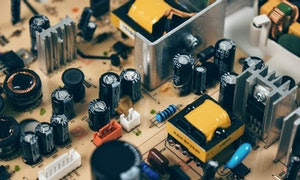In the 1740s, scientists first invented the most punctual types of capacitors. In 1748, Benjamin Franklin associated a progression of containers together to make what he called an "electrical battery", from their visual comparability to a battery of gun, which turned into the standard English term electric battery. Today we will learn how some energy stored in the capacitor and also the applications of the capacitor.
The capacitor is an electrical component for storing and discharging energy. A capacitor consists of two electrodes and separated by air or a dielectric medium. When current passes through a capacitor, the electrode allows electrons to pass through a dielectric medium. These produce an electrical field that allows energy-storing in capacitors. These ionize the electric medium and this field stores energy. There is a produced mechanical force between the plate.
Energy stored in Capacitor
Energy stored in capacitors is related to charge(Q) and voltage(V). The energy store in the capacitor also depends upon the dielectric material in the capacitor. Some dielectric materials are:
- Vacuum
- Air
- PolyroplenePP
- polyphenylene Sulfide
- polysterPET
- PolysterPEN
- Impregnated paper
- Mica
- AluminiumOxide
- Tantalum Oxide
- Paraelectric Ceramics
- Barium Titanate
Energy stored in capacitors is work done to built upcharge on the plates. Energy stored by capacitors is electrical potential energy stored in it. Average potential developed across the plate from zero volts to full volts is,
Average Potential(P.E) = (1/2)V ,
So, energy stored in capacitor = (1/2)QV,
Substituting Q, Q = CV,
Energy stored in capacitor = (1/2) CV²
where Q is for a charge, V is for Voltage and C is the capacitance of a capacitor.
Application of a capacitor involving energy storage
There is much application for energy stored in a capacitor. They are used in camera flashes, audio devices, uninterrupted power supply, lasers, regenerative brakes, and much more. Latest inventions like the ultracapacitors or supercapacitors with the extremely high capacitance of 2 kilofarad (kF). Supercapacitors can store a large amount of energy and offers new possibilities in different fields. We use them in electric cars, electrical motors, and computer memory backup during power loss. Energy stored in a supercapacitor helps us to operate and maintain a micro-grid system.
Some of the Applications
Camera flash
Electronic camera flashes are xenon flash tubes. Before a shot, the internal capacitor is charged with high voltage and the camera is ready to use. When the camera is pressed, the energy stored in the capacitor is discharged instantly into the tube. These create a very short current impulse. The stored energy in the capacitor converts to a flash of light. These last about one millisecond.
Bug Zappers
The Bug zappers are used for insect control or insect electrocution trap. Bug zappers consist of diodes and capacitors, which increase the supply voltage by 2kilovolts (KV). The energy stored in the capacitor releases instantly when an insect creates a short between the circuit terminals.
Regenerative Braking
Modern cars use Regenerative braking which is modern technology. Supercapacitor stores a huge amount of energy produced from the braking system of vehicles. Supercapacitor converts and stores a portion of kinetic energy to electrical energy. In this way, driving a car downhill and using regenerative brakes increases the efficiency of the vehicle.
Micro-grid System
The Micro-grid system is a small scale independent power grid system. It consists of multiple energy generations from renewable and non-renewable resources. Supercapacitors along with batteries serve as the hybrid energy storage system. We consider it as the most advanced cause of availabilities, low cost, high power density, long life cycle, and fast response time.
We use capacitors for many other purposes. The energy in capacitors can store charges for a long time after disconnected from the device. A high voltage capacitor can store charge for a long time. These may cause an electrical shock hazard. Therefore, it is important to discharge capacitors before use.
Please comment below if you have any question
Post by Samrat Bose








0 Comments
Thank you for your feedback